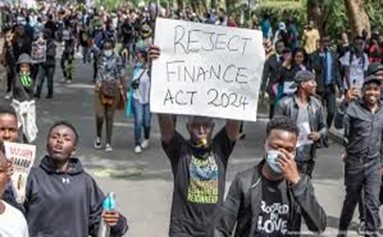
“We will not fund your greed.”
The rallying cry of Kenya’s Gen Z protesters, 2024.
The Cry That Shook the Nation
In June 2024, a cry echoed through Kenya’s digital streets, quickly spilling into highways, town halls, and parliament gates: #RejectFinanceBill2024. What began as an online protest by Kenya’s so-called “keyboard warriors” — Generation Z — rapidly transformed into a national movement that rattled the political elite. For many, it was about the Finance Bill. But for Kenya’s youth, especially Gen Z, the real trigger was something far deeper, systemic, and structural: economic violence.
What Is Economic Violence?
Economic violence is more than just poverty. It’s a form of systemic oppression: the deliberate denial of opportunities, the weaponization of policies, and the entrenchment of inequality through economic systems that serve the few while suffocating the many.
“Economic violence is when a graduate becomes a boda boda rider, not by choice, but because the system offers no alternative.”
In Kenya, this violence shows up in many ways: – Unemployment despite education – Excessive taxation with minimal public service delivery – Elite corruption while citizens struggle for basic needs – A political economy built on exclusion and patronage
Gen Z: The Inheritors of Broken Promises
Kenya’s Gen Z — born between 1997 and 2012 — are digital natives and politically aware. They are witnesses to national decline. They grew up watching their parents sacrifice and vote — only to see life worsen.
But Gen Zs are different. They are not bound by tribal loyalty or political history. They are driven by justice, survival, and truth. And when the Finance Bill 2024 threatened their already bleak future, they mobilized — fast and fearlessly.

Signs of Economic Violence in Kenya
1. Weaponized Taxation:
Kenya has become a taxation state. In 2024, the Finance Bill proposed taxing essentials: fuel, bread, mobile money, and digital content. For Gen Zs, this was the last straw.
“We’re being taxed to die, not to live,” one placard read in Nairobi.
2. Youth Unemployment
With over 67% of unemployed Kenyans under 35, the job market offers little hope. Internships without pay, job listings requiring 5 years’ experience, and an economy rigged against youth enterprise form a toxic cocktail of despair.
3. High Cost of Living
Electricity, rent, food, and transport costs have soared. Yet salaries remain stagnant. NHIF reforms into SHA left millions’ health uninsured. For many Gen Zs, living is now a luxury.
The Protest Wasn’t Just About a Bill
The Gen Z-led protests were not spontaneous. They were a rebellion against years of structural exclusion, corruption, and misgovernance.
“It’s not just about bread. It’s about justice.”
Youth used Twitter (X), TikTok, Facebook, YouTube, WhatsApp groups and X Spaces to mobilize. They created posters, memes, legal briefs, livestreams, and security tips — all in real time. They turned protest into digital resistance.
The Globalization Trap
Kenya’s economic policies are deeply tied to IMF and World Bank conditionalities. In 2023, IMF-backed austerity saw public sector budget cuts and increased domestic taxation.
Global institutions often demand debt repayments through revenue collection, but it is the common mwananchi, especially Gen Z, who bears the brunt. That is economic violence imported.
Gendered and Classed Economic Violence
Economic violence hits women harder. Young women face exclusion from employment, gender pay gaps, and unsafe work environments.
Likewise, youth in informal settlements lack internet, education, and support systems. Economic violence isn’t equal — it’s gendered, racialized, and classed.
What Needs to Change?
1. Rewrite the Social Contract
Government must deliver services in exchange for taxes. Budget transparency, civic inclusion, and youth participation must be prioritized.
2. End Elite Impunity
Corruption must be punished. Billions lost annually could fund youth employment, healthcare, and education.
3. Reframe Economic Policy
Kenya must move from punitive taxation to inclusive, productive economics — investing in youth-led innovation, agriculture, tech, and the green economy.
4. Recognize Digital Youth Power
Gen Z has redefined activism. They deserve to co-create national policy, not just be consulted after decisions are made.
The Future Is Unapologetically Youthful
Economic violence is real, invisible, and suffocating. But Gen Z has refused to remain silent. The 2024 protests showed that Kenya’s youth are not just angry — they are organized, strategic, and determined.
“In 2025 and beyond, the call remains the same: End economic violence. Restore economic justice. Let the youth breathe.”


Sign up